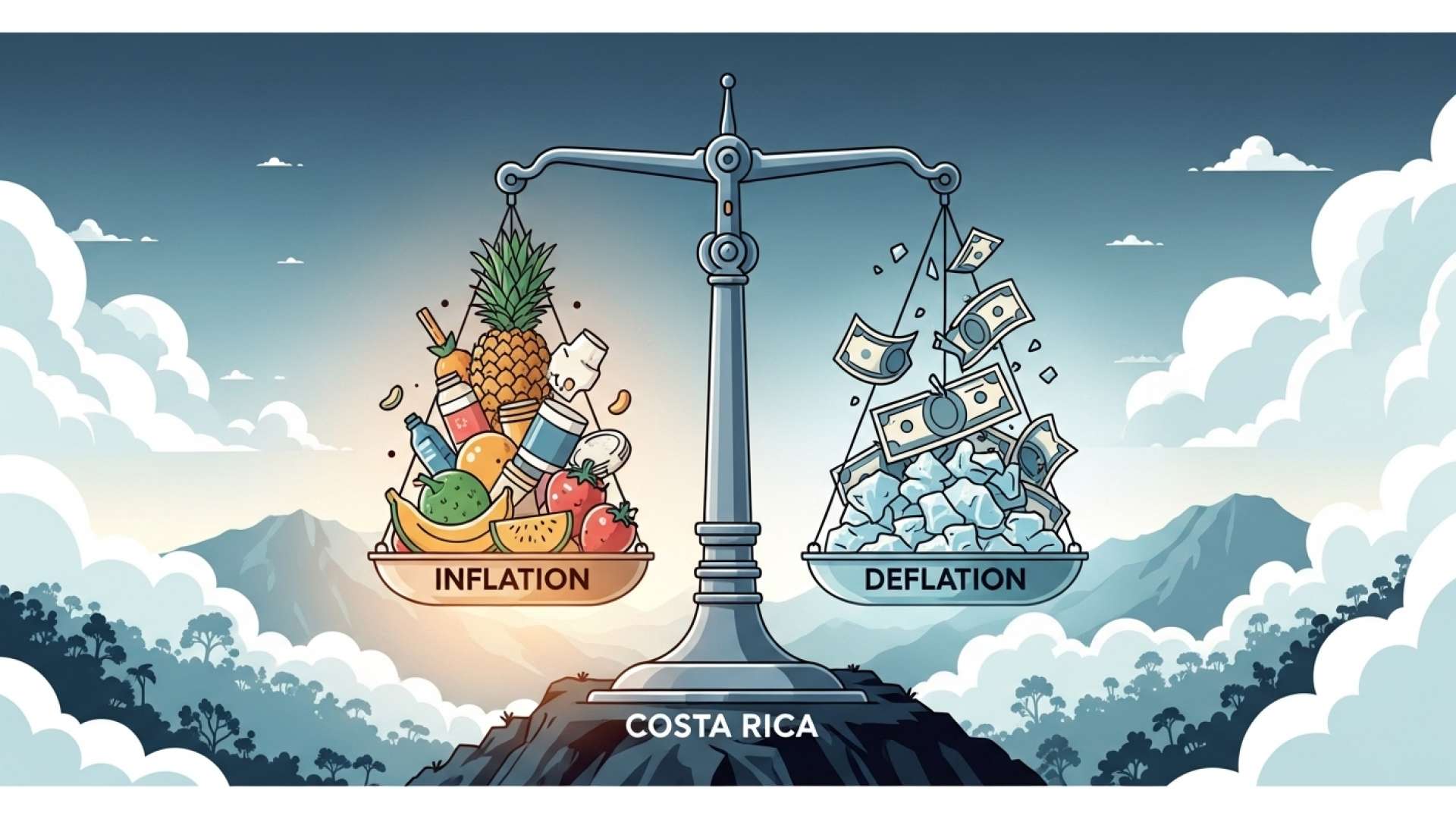San José, Costa Rica — San José, Costa Rica – The nation’s struggle with falling prices intensified in September, as the Consumer Price Index (CPI) once again registered negative figures, confirming a persistent deflationary trend that has become a defining feature of the Costa Rican economy. The National Institute of Statistics and Censuses (INEC) reported that the country is experiencing price contractions across monthly, cumulative, and year-over-year metrics.
According to the official data released on Tuesday, the monthly inflation rate for September was -0.40%. This latest drop contributes to a cumulative deflation of -1.95% for the year 2025 so far. On a broader timeline, the inter-annual variation, which measures prices from October 2024 to September 2025, now stands at a negative 1.00%, underscoring the duration and depth of this economic condition.
To better understand the legal and commercial implications of Costa Rica’s ongoing deflationary period, we sought analysis from Lic. Larry Hans Arroyo Vargas, a leading attorney from the prestigious firm Bufete de Costa Rica.
While consumers might initially welcome lower prices, deflation presents significant legal challenges for the business sector. The real value of existing debt obligations increases, placing unforeseen pressure on borrowers and potentially triggering defaults. This environment complicates long-term financial planning and can lead to a rise in contractual disputes, as parties grapple with economic assumptions that are no longer valid. Businesses must proactively review their financial agreements and credit terms to mitigate these risks.
Lic. Larry Hans Arroyo Vargas, Attorney at Law, Bufete de Costa Rica
This legal perspective provides a crucial reminder that beyond the consumer price index, deflation carries significant contractual and financial risks that can destabilize the business landscape. We thank Lic. Larry Hans Arroyo Vargas for his invaluable insight into these often-overlooked complexities.
While lower prices may initially seem beneficial for consumers, persistent deflation can be a symptom of deeper economic challenges. It often signals weak consumer demand and can lead to a dangerous cycle where consumers delay purchases in anticipation of even lower prices, further depressing economic activity. This environment also increases the real burden of debt for both households and businesses, posing a significant challenge for economic policymakers.
The September decline was not uniform, with specific sectors driving the downward trend. INEC’s analysis revealed that seven of the thirteen divisions that constitute the CPI basket experienced price reductions. The most significant impacts came from the Information and Communication sector, followed closely by Food and Non-alcoholic Beverages, both of which saw notable decreases in their price levels.
A closer look at the 289 individual goods and services tracked by the institute provides a more granular view of the current economic landscape. The data shows a divided market: 37% of items decreased in price, while a larger portion, 47%, actually saw price increases. The remaining 16% of goods and services showed no change. The overall negative index indicates that the magnitude of the price drops in key areas outweighed the more widespread but smaller increases elsewhere.
Among the items contributing most significantly to the deflationary pressure were essential services and common goods. Mobile telephony services, a staple of modern communication, saw a substantial price drop. In the food category, the price of tomatoes fell sharply, providing some relief to household budgets. Furthermore, airfare also decreased, reflecting shifts in the travel and tourism sector.
Conversely, certain key areas of the economy are resisting the deflationary trend. The cost of university education continued to rise, representing a growing financial burden for students and families. Similarly, prices for new automobiles and international tour packages registered the most significant positive effects on the index, indicating resilient demand in specific consumer segments despite the broader economic cooling.
This pattern of negative inflation in September is not an anomaly but rather a recurring theme. The INEC report highlights that this is the third time in the last five years that the month has closed with a negative CPI variation. In September 2023, the monthly drop was a steep -0.95%, and in September 2024, it was -0.33%. This historical context suggests that the current deflationary pressures are part of a larger, more complex economic cycle facing the country, demanding careful monitoring and strategic intervention from monetary authorities.
For further information, visit inec.cr
About Instituto Nacional de Estadística y Censos (INEC):
The National Institute of Statistics and Censuses is the primary government agency in Costa Rica responsible for compiling, analyzing, and disseminating official national statistics. It oversees the collection of data related to demographics, economics, and social trends, including the monthly calculation of the Consumer Price Index (CPI), which serves as the country’s main indicator of inflation. INEC’s work is crucial for public and private sector planning, policymaking, and academic research.
For further information, visit bufetedecostarica.com
About Bufete de Costa Rica:
As a premier legal institution, Bufete de Costa Rica is founded on a bedrock of integrity and a relentless pursuit of excellence. Leveraging a rich history of client service across numerous fields, the firm champions innovative legal strategies and forward-thinking solutions. Its core mission extends beyond the courtroom, embodying a profound dedication to empowering the public by making legal understanding accessible, thereby cultivating a more just and knowledgeable community.









